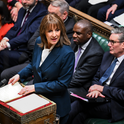If the government is serious about boosting left-behind places, ministers need to address the disparities in our school system. In too many places, children’s prospects are being held back by schools that do not offer a decent education. In 2017, Ofsted found 490 “stuck” schools in England that had been in a cycle of inadequacy for five years or more. Research by our think tank Onward published last Friday estimated that currently over 200,000 primary-age pupils live in an area containing only Requiring Improvement or Inadequate schools.
In some local authorities—such as Knowsley, Middlesbrough, Kingston upon Hull and Hartlepool—attainment at GCSE level was in the bottom decile across England in 1998, and still is today. Successive Ofsted ratings have revealed how these places lack the teaching quality, leadership and culture of aspiration that children need to succeed. Yet governments have repeatedly struggled to address these failings, leaving generation after generation barred from achieving their potential.
We face a choice. We can continue to let these places muddle through for years on end, or we can take the difficult decision to intervene. Most parents in these places would agree that the former option has clearly not worked. While school intervention is disruptive—and if done badly, can undermine the learning outcomes of the pupils we are trying to help—it is significantly more damaging to keep children in schools we know are not delivering for their pupils, and have not been for some time, than to take steps to bring these schools up to an acceptable standard.
The government has so far focused mostly on addressing the significant impact of the pandemic on children’s learning. This is right—and further intervention on this front will be required. But on its own it will not address the long-standing regional differences in our school system. The government needs a long-term, structural strategy to drive up school quality in the places where it is worst. Instead of piecemeal reforms, we need a national effort. Instead of new initiatives, we need to build on what we know works, using the partners who have proven they can deliver.
Multi-Academy Trusts with a track record of school improvement can be the engines of change. We should encourage the best MATs—as judged by Ofsted, which should be given the power to inspect them—to take on clusters of underperforming schools, offering generous, sustained funding to help them grow in size. If we the want talented individuals who lead successful MATs to put their reputation on the line they need to be sufficiently compensated. This extra government funding should be guided by a serious assessment of all MATs, based on the ability to turn around an underperforming school but also taking into account factors like financial resilience and continuing professional development provision.
We also need to be much more upfront when the system isn’t working. In extreme cases, when schools have been on the receiving end of countless interventions with no evidence of progress, we should be prepared to close the school and let a new free school rise from the ashes. Regional Schools Commissioners should be in charge of matching these new “phoenix schools” with accomplished MATs to give them the best chance to succeed, and granting them an accountability holiday to help turn the tide. That will give the parents and children previously stuck with a stubbornly underperforming school a fresh start.
But we should be equally intolerant of outstanding schools not delivering for the most disadvantaged pupils. We have seen numerous reports of schools off-rolling challenging pupils so as not to bring down their grade averages or disrupt their Ofsted inspections in recent years. However, as our research reveals, the real injustice may be at the admission stage. Even when you consider schools in similarly income deprived areas, Good and Outstanding schools still take on less than their fair share of disadvantaged pupils. We need better accountability to address this, with Ofsted rating schools specifically on how well they serve the most disadvantaged pupils, and marking up those who do best. This should drive a virtuous cycle, where instead of off-rolling difficult children, schools are actively incentivised to focus on those who need the most help.
And in the places where schools remain stubbornly poor, ministers should be prepared to throw the sink at driving up school quality. We should set targets for areas to meet the national attainment average within five years, with funding and institutional attention to make it happen.
In order to level up, the government must address the inequities of the school system. Two decades of education reform have achieved much, but left many places, often in the poorest regions, still lagging far behind. We hear a lot about infrastructure investment, job creation, new roads and connectivity, but no wage or job title will convince parents to move somewhere if it will limit the opportunities for their children down the line. And if children in Knowsley, or Doncaster or Hartlepool continue to have fewer good schools to choose from than their peers in the Greater South East, the regional inequalities that bedevil the UK economy are unlikely to narrow.












